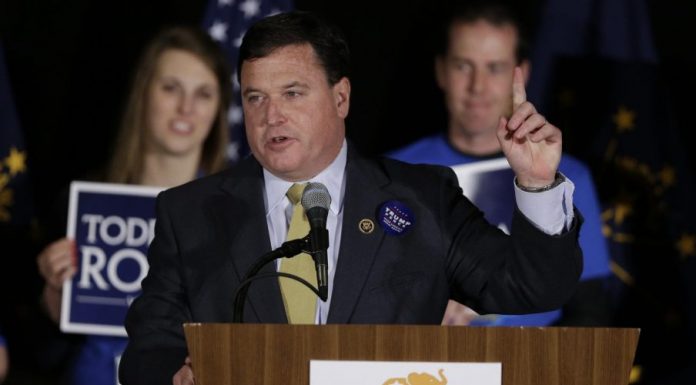(Margaret Menge, The Center Square) Indiana Attorney General Todd Rokita said Wednesday that Indiana University’s vaccine mandate “clearly violates” the new state law on vaccine passports which prohibits the state and local governments from requiring proof of vaccination.
Rokita soundly rejected IU’s argument that it is not a part of the state and so not covered by HB 1405, which passed the Indiana General Assembly and was signed into law by Gov. Eric Holcomb on April 29.
“Public universities, and their boards of trustees, are created through statute and receive their corporate powers through legislation,” Rokita said in a 7-page legal opinion that was addressed to two legislators and blasted out to the media. “There is no statutory exemption for public universities under Ind. Code ch. 16-39-11, so the new law applies to public universities.”
Rokita’s opinion applies not just to IU students, but also to faculty and staff of Indiana University on all campuses in the state.
IU, says Rokita, “unquestionably violates the new law by requiring its students, faculty, and staff to show proof of immunization as a condition of continued attendance or employment.”
The opinion was issued at the request of Reps. Peggy Mayfield, R-Bedford, and Andy Zap, R- Huntington, and in response to IU’s announcement Friday it would require all students, faculty and staff to get the COVID-19 vaccination.
In the announcement, the IU administration said “exemptions will be strictly limited to a very narrow set of criteria, including medical exemptions, and documented and significant religious exemptions.”
On Tuesday, the university denied at least two requests by undergraduate students for religious exemptions for summer study abroad programs. In one case, the university challenged the student, writing in an email to her: “We note that your request for a religious exemption is in conflict with your prior vaccination history. Therefore unless you can establish a change in your religious beliefs since your last vaccination this exemption request is denied.”
“I am incredibly heartbroken to say the least,” she wrote in an email. “I truly believe IU waited until the last minute on purpose to leave students with no options.”
Following the Friday announcement, students, parents and employees flocked to social media and called the governor’s office and state legislators. More than 8,000 people had signed a Change.org petition to get IU to retract its policy.
Rokita’s opinion appears to put the rest the question of whether the vaccine passport law applies to IU, and whether IU can require proof of vaccination. But it also raises issues about IU’s stated intent to punish students by cutting off their email, access to all university systems, and by cutting off their ability to pay for things on campus, and even at the grocery store, using a card that is tied to their bursar’s account.
“Unlike Purdue, IU gives students, faculty and staff no other option or alternative to vaccination,” the opinion says. “Students who fail to comply ‘will have their class registration cancelled, CrimonCard access terminated, access to IU systems (Canvas, email, etc.) terminated, and will not be allowed to participate in any on campus activity.’”
It also references the statement that faculty and staff who refuse “will no longer be able to be employed by Indiana University” and that “working remotely to avoid meeting the COVID-19 requirement is not an option.”
“IU provides no choice to its students, faculty and staff – not only must they be vaccinated, but they must also provide proof of it to the university to maintain their status as a student or employee. This seems precisely what the new law was intended to avoid,” the opinion says.
Before the announcement by Rokita, and the distribution of his legal opinion, First Amendment lawyer Jim Bopp had agreed to represent plaintiffs in taking action against the university, saying it is “completely unconstitutional” for any governmental body to inquire into anyone’s religious beliefs, saying the university has already violated the constitutional rights of students whose exemptions it denied after asking questions about their faith.
“The only thing the government can do when someone asserts a religious belief is to honor it,” he said on Wednesday. “They don’t have a choice. It’s unconstitutional for the government to judge whether or not a particular religious belief is suitable, appropriate, quote legitimate unquote.”
He also questioned whether IU’s stated desire to protect students was rational, saying, there are other greater risks of death to college students than the COVID-19 virus.
“For instance, lightning strikes. Has IU mandated that all students stay inside when it rains? Or they don’t care about that risk?” he said. “Have they prohibited IU students from driving? Or they just don’t care if they get killed by automobiles? So this is a legitimate question. Is this policy rational, or are they just on some woke reaction to what at this point is really, in large part, under control?”…Original Source…

